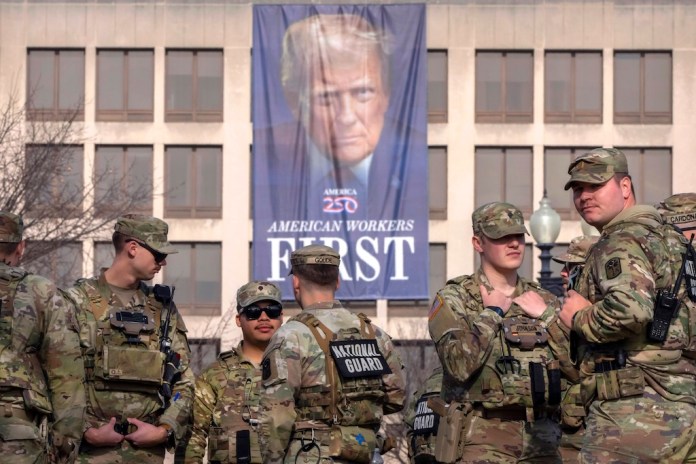CA Judge Ready To Wrest Control Of National Guard From Trump
In a recent legal battle involving the deployment of the California National Guard, Governor gavin Newsom opposed President Donald Trump’s federalization of the troops in response to civil unrest following an attack on federal agents adn properties. After Trump ordered the deployment, Newsom sought an emergency restraining order to regain control over the National Guard, which a federal judge initially denied.Though, after a hearing, Judge Charles Breyer sided with Newsom, issuing an injunction against Trump’s deployment. This decision was quickly challenged by the Trump governance, which appealed to the Ninth Circuit Court.
The appellate court promptly stayed Breyer’s injunction, affirming that Trump was likely to succeed in his appeal based on federal law permitting the federalization of state National Guards under certain conditions. The court criticized Breyer’s reasoning, emphasizing presidential deference in such matters. Following this ruling, a hearing was scheduled to address further claims, including those related to the Posse comitatus Act, which restricts military involvement in civilian law enforcement. Analysts suggest that breyer might attempt to reimpose restrictions based on this act, despite arguments that Trump’s actions were justified under federal law.
Legal expert Margot Cleveland warns that any future injunction could be flawed, as the Posse Comitatus Act dose not allow private enforcement, nor would trump’s actions constitute illegal military use of force. The outcome of this legal confrontation may have meaningful implications for the balance of state and federal powers in law enforcement and military deployment.
“The fight doesn’t end here.” Gavin Newsom made that announcement on Thursday, soon after a federal appellate court ruled President Donald Trump retains control over the California National Guard. By Friday morning, the overturned district court judge repeated the mantra, but in subtler, more judicious terms designed to obscure his bias and his intent to halt the president’s use of the National Guard and Marines in Los Angeles. The apparent plan is now to find the president’s deployment violates the Posse Comitatus Act, which goes to show that judges bent on executing a coup by courts also have six ways to Sunday to rebel against the duly elected president.
After rioters attacked ICE agents and federal property in California, on June 7, 2025, President Trump federalized the California National Guard. Once under federal command, Secretary of Defense Pete Hegseth ordered thousands of National Guard troops to deploy to Los Angeles. Secretary Hegseth later also deployed some 700 active-duty U.S. Marines from Camp Pendleton to Los Angeles.
Within days of the president’s federalizing of the California National Guard, Governor Newsom filed a multi-count complaint in a San Francisco federal court. Then, at 11:00 a.m., on June 10, 2025, the governor asked the court to immediately (by 1:00 p.m.) grant him an ex parte temporary restraining order, barring the deployment of troops in Los Angeles and directing the president to return control of the National Guard to the governor. Presiding Judge Charlies Breyer instead provided the Trump administration 24 hours to respond to the motion and set a hearing for June 12, 2025, at 1:30 p.m.
Judge Breyer opened the June 12, 2025 hearing by noting he had refused to grant the requested injunction on an ex parte basis, with the Clinton appointee stressing the importance of hearing from both sides before ruling. However, Judge Breyer soon made clear his fist was firmly on Governor Newsom’s side of the scale, with the federal judge appropriating the language of the left and declaring we have no king in America.
It came as no surprise, then, to court listeners that by day’s end Judge Breyer had entered an injunction against President Trump, enjoining him “from deploying members of the California National Guard in Los Angeles,” and directing the Commander-in-Chief “to return control of the California National Guard to Governor Newsom.” The court stayed his order until noon on Friday, June 13, 2025.
The Trump administration immediately sought a stay of Judge Breyer’s injunction in the Ninth Circuit Court of Appeals — the federal circuit court that hears appeals from district courts in California, among other western states. Within hours, a three-judge panel of the federal appellate court entered an administrative stay of Judge Breyer’s order, keeping the president in charge of the National Guard. The Ninth Circuit then set an expedited briefing schedule and scheduled a hearing for Tuesday, June 17, 2025.
Last Tuesday, Trump appointees Judges Mark Bennette and Eric Miller, joined by Biden-appointee Judge Jennifer Sung, heard the parties’ argument concerning the propriety of the injunction. Two days later, in a unanimous opinion, the court held the Trump administration “made the required strong showing that they are likely to succeed on the merits of their appeal,” and stayed the lower court’s injunction against the president. That stay left the California National Guard under federal control and deployed in Los Angeles, as directed by Secretary Hegseth.
In concluding that Trump was likely to succeed on the merits of his appeal, the Ninth Circuit focused on Newsom’s claim that the president lacked authority under 10 U.S.C. § 12406 to federalize the California National Guard. That federal statute authorizes the president to federalize the National Guard of a state whenever, among other things, “the President is unable with the regular forces to execute the laws of the United States . . . ”
While Judge Breyer concluded that Trump had failed to establish that he was unable with regular forces to execute the laws of the United States, the Ninth Circuit rejected the lower court’s reasoning in two respects. First, the three-judge panel concluded that courts owe great deference to the president’s conclusion that regular forces are unable to execute federal law.
Thus, so long as the president’s decision “reflects a colorable assessment of the facts and law within a ‘range of honest judgment,’” courts cannot substitute their judgment for the president’s. Yet that was precisely what Judge Breyer did when he personally assessed whether the factual predicate proffered by the president left Trump “unable to execute federal law.”
The Ninth Circuit highlighted a second fundamental error in Judge Breyer’s decision, namely the lower court’s conclusion that Trump’s federalization of the California National Guard was not justified because the federal government was not completely thwarted in its efforts to execute federal law. The appellate court rejected that argument, agreeing with the Trump administration’s position that “Section 12406(3) cannot plausibly be read to mean that so long as some amount of execution of the laws remains possible, the statute cannot be invoked . . .”
The federal appellate court then concluded that “[u]nder a highly deferential standard of review, [the Trump administration has] presented facts to allow us to conclude that the President had a colorable basis for invoking § 12406(3).” Thus, Trump had a strong likelihood of success on the merits of Newsom’s § 12406(3) claim and the Ninth Circuit accordingly stayed Judge Breyer’s injunction.
The morning following Trump’s win in the Ninth Circuit, the president found himself back before Judge Breyer for a previously scheduled hearing on Newsom’s Motion for a preliminary injunction. Judge Breyer opened the hearing by noting that the Ninth Circuit had converted his TRO into a preliminary injunction and then, after concluding Trump was likely to succeed on the merits of the § 12406(3) claim, the federal appellate court stayed the injunction. Judge Breyer then noted that as a district court judge, his decisions are reviewed by the Ninth Circuit, and just as the parties can’t ignore his decisions, he can’t ignore the Ninth Circuit’s decision.
But the Ninth Circuit never said anything about Newsom’s Posse Comitatus Act claim, Judge Breyer quickly noted, as he had not ruled on that claim at the TRO stage and thus it was not presented to the appellate court. Instead, Judge Breyer’s TRO noted the court would consider the Posse Comitatus Act claim at the preliminary injunction hearing. And that was the original purpose of Friday’s hearing — to consider Newsom’s Motion for a preliminary injunction.
Things were more complicated, though, once the Ninth Circuit had converted Judge Breyer’s TRO into a preliminary injunction, which now remains pending in the appellate court. Generally speaking, an appeal deprives a lower court of jurisdiction over the case. But during Friday’s hearing, Judge Breyer suggested that he may nonetheless retain jurisdiction to modify his injunction based on the Posse Comitatus Act claim. He then directed the parties to file supplemental briefs on this jurisdictional question by Monday at noon.
This tack mirrors Judge Breyer’s prior approach, where he stressed the importance of hearing from both parties before ruling, only to then ignore the Trump administration’s position and enter a glaringly flawed injunction against the president. That history suggests Judge Breyer is poised to again enter an injunction against Trump’s deployment of the National Guard to Los Angeles, while also adding a bar on the president’s use of the Marines, based on the Posse Comitatus Act.
Such an injunction would be equally flawed, for two main reasons. First, the Posse Comitatus Act is a criminal statute that does not provide for private enforcement by anyone, much less a state that suffers no injury. Second, Trump’s deployment of the National Guard and Marines to protect federal personnel and property does not violate the Posse Comitatus Act, which prohibits the “willfully use[] any part of the Army, the Navy, the Marine Corps, the Air Force, or the Space Force as a posse comitatus or otherwise to execute the laws . . .”
But it is ICE and DHS who are executing the laws and not the Marines or the National Guard, with the latter merely protecting the federal agents and federal property. And even if it becomes necessary for members of the military to detain individuals to protect federal personnel and property, the Trump administration would still not be willfully using the military to execute the law.
That likely won’t matter to Judge Breyer, however, given he already granted Newsom one lawless TRO — but we won’t know for sure until later this week.
Margot Cleveland is an investigative journalist and legal analyst and serves as The Federalist’s senior legal correspondent. Margot’s work has been published at The Wall Street Journal, The American Spectator, the New Criterion, National Review Online, Townhall.com, the Daily Signal, USA Today, and the Detroit Free Press. She is also a regular guest on nationally syndicated radio programs and on Fox News, Fox Business, and Newsmax. Cleveland is a lawyer and a graduate of the Notre Dame Law School, where she earned the Hoynes Prize—the law school’s highest honor. She later served for nearly 25 years as a permanent law clerk for a federal appellate judge on the Seventh Circuit Court of Appeals. Cleveland is a former full-time university faculty member and now teaches as an adjunct from time to time. Cleveland is also of counsel for the New Civil Liberties Alliance. Cleveland is on Twitter at @ProfMJCleveland where you can read more about her greatest accomplishments—her dear husband and dear son. The views expressed here are those of Cleveland in her private capacity.
" Conservative News Daily does not always share or support the views and opinions expressed here; they are just those of the writer."




